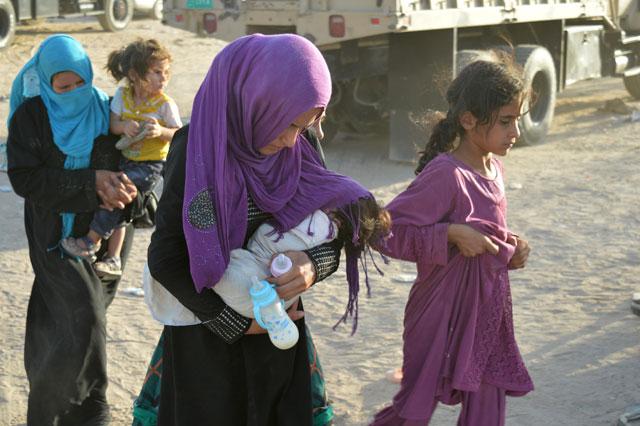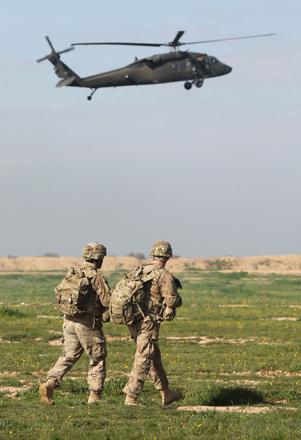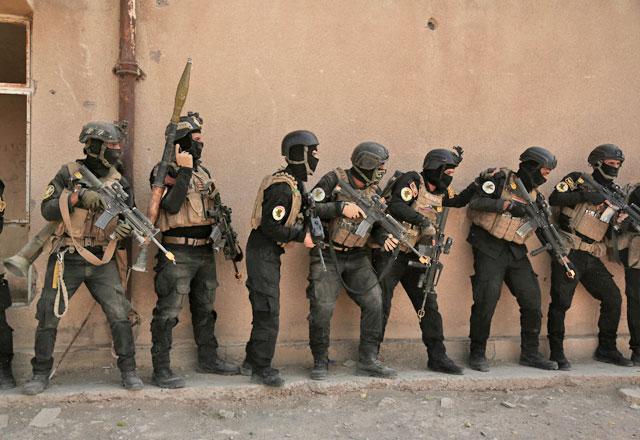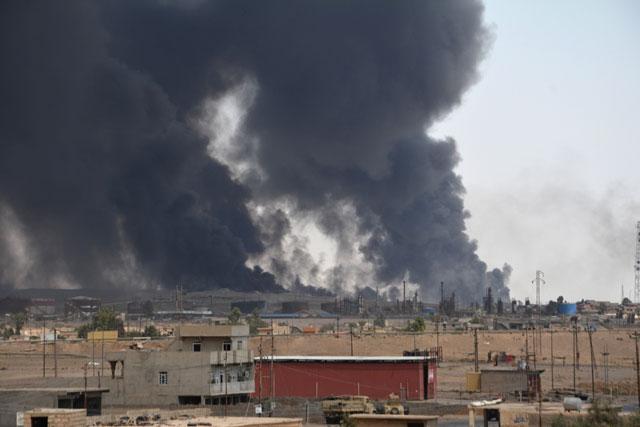You are here
US to send 560 more troops to aid Iraq’s anti-Daesh fight
By AFP - Jul 11,2016 - Last updated at Jul 11,2016

Displaced people, who fled Daesh violence, are seen in Lake Al Tharthar, northwest of Baghdad, Iraq, on Sunday (Reuters photo)
BAGHDAD — Pentagon Chief Ashton Carter said Monday that Washington will deploy 560 additional troops to aid Iraq's fight to retake Mosul from extremists, deepening US military involvement in the country.
The announcement, which will bring the total authorised number of American military personnel in Iraq to more than 4,600, came two days after Baghdad said it had recaptured a base south of Mosul that is seen as an important step towards the eventual battle for the city.
Iraq's second city Mosul has been under the Daesh terror group control since June 2014, when the extremists overran large parts of Iraq, carrying out atrocities including execution-style killings, mass kidnappings and rape.
Daesh also holds territory in neighbouring Syria, but has lost significant ground in both countries, and Carter wanted to highlight successes, even as the extremists have struck back with devastating attacks in Iraq and abroad.
"I am pleased to report today that... we agreed for the United States to bolster Iraqi efforts to isolate and pressure Mosul by deploying 560 additional troops," Carter said at the Baghdad airport following meetings with the Iraqi premier and defence minister.
"With these additional US forces we are describing today, we will bring unique capabilities to the campaign... at a key moment," Carter said.
'Springboard' to Mosul
President Barack Obama made ending the US's nearly nine-year war in Iraq a centrepiece of his presidency, but Washington has been drawn ever deeper back into the country by the war against Daesh.
And while most of the US forces in Iraq are in non-combat roles, others have directly battled Daesh, and three American military personnel have been killed by the extremists.
"The additional troops will provide a range of support for Iraqi security forces, including infrastructure and logistical capabilities at the airfield near Qayyarah," the Pentagon said in a statement.
Prime Minister Haider Al Abadi announced Saturday that Iraqi forces had recaptured the Qayyarah air base, some 60 kilometres south of Mosul, which Daesh seized in June 2014.
The base "will become a vital springboard for the [Iraqi forces'] offensive into Mosul", the Pentagon said.
Lt. Gen. Sean MacFarland, the commander of the US-led operations against Daesh, said that the "preponderance" of the 560 additional troops will be based at Qayyarah, and would start being deployed “relatively soon”.
Earlier in the day, Carter held meetings with Abadi as well as Defence Minister Khalid Al Obeidi, offering his condolences for recent Daesh attacks and congratulations on Iraqi advances.
Daesh has carried out bloody attacks against civilians as it loses ground, including a bombing in Baghdad earlier this month that killed 292 people, one of the deadliest to ever hit the country, and an attack on a Shiite shrine a few days later in which 40 died.
Pushing Daesh back
Ahead of his meetings, Carter told journalists flying with him to Iraq that he would discuss the next moves in the war against the extremists.
“What I’ll be discussing with Prime Minister Abadi and our commanders there are the next plays in the campaign, which involve the collapse and control over Mosul,” he said.
The ultimate goal was “the recapture of all of Iraqi territory by the Iraqi security forces, but of course Mosul is the biggest part of that”, Carter said.
US defence officials say the campaign’s first “10 plays” have been successfully completed in the US-led counter-Daesh campaign in Iraq and Syria.
These steps include the recapture of several important areas across the two countries, including Ramadi in Iraq and Al Shadadi, a town in northeastern Syria previously considered a strategic Daesh stronghold.
Carter and Obama have been criticised for the pace of the campaign, which began in autumn 2014 and got off to a slow start, particularly in war-torn Syria, where the United States had few assets on the ground to provide targeting information.
The Pentagon has announced a series of measures to speed up the war, including a revised mission to train anti-Daesh rebels in northern Syria and extra advisers for Iraqi forces.
Coupled with coalition air support, the results have seen Daesh losing roughly half its territory in Iraq and about 20 per cent of its Syria claim, the Pentagon said.
Related Articles
ALBUQUERQUE, United States — The United States is sending about 600 extra troops to Iraq to train local forces for an upcoming offensive on
BAGHDAD — An unlikely array of forces is converging on the city of Mosul, lining up for a battle on the historic plains of northern Iraq tha
KIRKUK, Iraq — Iraqi forces on Wednesday closed in on the centre of Qayyarah, officials said, on the second day of an operation to recapture



















